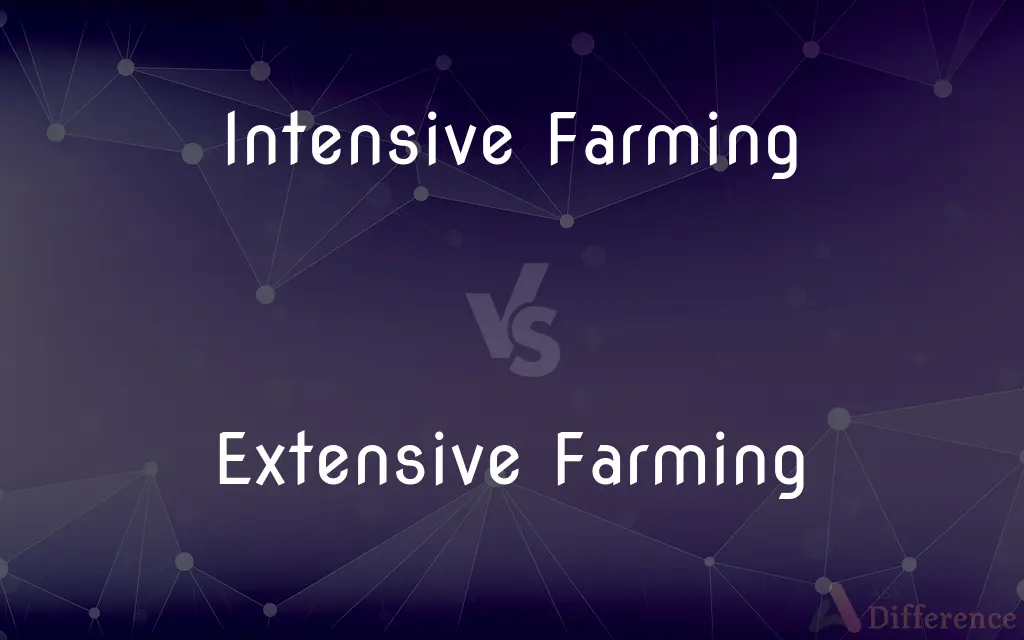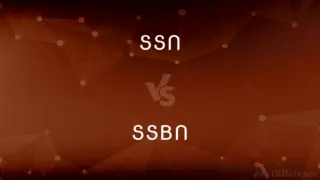Intensive Farming vs. Extensive Farming — What's the Difference?
By Tayyaba Rehman & Fiza Rafique — Published on October 30, 2023
Intensive farming focuses on high yield using limited land and resources, while extensive farming uses larger land areas with minimal inputs.

Difference Between Intensive Farming and Extensive Farming
Table of Contents
ADVERTISEMENT
Key Differences
Intensive Farming vs. Extensive Farming in Land Use: Intensive farming employs smaller land areas to maximize output. In contrast, extensive farming utilizes vast tracts of land with fewer inputs per acre.
Intensive Farming vs. Extensive Farming in Production Methods: Intensive farming often involves advanced technologies, fertilizers, and pesticides to boost yield. Extensive farming, however, typically relies on natural resources and may not employ advanced methods.
Intensive Farming vs. Extensive Farming in Labor and Capital: Intensive farming usually demands more labor and capital due to its specialized nature. Extensive farming is more about leveraging the vastness of land, often requiring less labor per unit area.
Intensive Farming vs. Extensive Farming in Environmental Impact: While intensive farming can potentially harm the environment due to chemicals and monocultures, extensive farming can lead to land degradation if not managed sustainably.
Intensive Farming vs. Extensive Farming in Economic Focus: Intensive farming typically aims for maximum profit by intensifying production processes. Extensive farming can have varied objectives, from subsistence farming to commercial production with a focus on sustainable methods.
ADVERTISEMENT
Comparison Chart
Land Use
Smaller areas, high yield
Vast areas, lower yield per acre
Production Methods
Advanced technologies, chemicals
Natural resources, fewer inputs
Labor and Capital
High labor and capital intensity
Less labor and capital per unit area
Environmental Impact
Potential harm due to chemicals, monocultures
Possible land degradation if unsustainable
Economic Focus
Maximum profit, high output
Varied objectives, often sustainability
Compare with Definitions
Intensive Farming
Aims for high yield and profit from limited resources.
Intensive farming systems might use greenhouses to boost production.
Extensive Farming
Typically has a lower yield per unit area compared to intensive farming.
While extensive farming uses more land, the per-acre output might be lower.
Intensive Farming
Farming that maximizes output from a small land area.
Intensive farming in urban areas often involves vertical gardens.
Extensive Farming
Agricultural system primarily relying on natural resources.
Extensive farming in the savannahs takes advantage of seasonal rains.
Intensive Farming
High reliance on inputs like fertilizers and pesticides.
Intensive farming can lead to soil depletion without proper care.
Extensive Farming
Can be geared toward subsistence or commercial production.
Extensive farming in remote areas might primarily support local communities.
Intensive Farming
Agricultural system using advanced technologies.
Intensive farming benefits from the latest irrigation techniques.
Extensive Farming
Often synonymous with sustainable and organic practices.
Some extensive farming methods focus on maintaining natural ecosystems.
Intensive Farming
Often associated with monocultures and high capital investment.
Modern intensive farming of corn involves specialized machinery.
Extensive Farming
Farming that utilizes vast areas with minimal inputs.
Extensive farming is common in Australian cattle ranches.
Common Curiosities
Can intensive farming be sustainable?
Yes, if done responsibly with rotation, proper waste management, and mindful chemical use.
What's the main goal of intensive farming?
Intensive farming aims to maximize output using limited land and resources.
Is extensive farming always organic?
Not necessarily, but it often employs more natural and sustainable methods.
Which type of farming requires more land?
Extensive farming uses larger tracts of land compared to intensive farming.
Why might a farmer choose intensive methods?
To increase yield and profit, especially in areas with limited land availability.
Is extensive farming less profitable than intensive farming?
Not necessarily. Profitability varies based on various factors, including market demand and operational costs.
How do market demands influence intensive farming?
High demand often drives intensified production to meet supply needs.
Are extensive farming practices always environmentally friendly?
Not always, but they often align with sustainable and eco-friendly principles.
Which farming method is more labor-intensive?
Intensive farming usually requires more labor per unit area than extensive farming.
Can extensive farming methods be modernized?
Yes, they can incorporate technology while maintaining their core principles.
Why is intensive farming sometimes criticized?
Due to potential environmental harm, soil degradation, and overuse of chemicals.
What's a typical extensive farming setup?
Large pastures, rangelands, or areas with low-input crops.
Can both farming methods coexist in modern agriculture?
Absolutely. Both methods have their merits and can complement each other in diverse agricultural setups.
How does extensive farming support biodiversity?
By maintaining varied ecosystems and avoiding monocultures.
Do intensive farms always use chemicals?
Not always, but many rely on them to boost yield and control pests.
Share Your Discovery

Previous Comparison
SSN vs. SSBN
Next Comparison
Homologous Chromosomes vs. Sister ChromatidsAuthor Spotlight
Written by
Tayyaba RehmanTayyaba Rehman is a distinguished writer, currently serving as a primary contributor to askdifference.com. As a researcher in semantics and etymology, Tayyaba's passion for the complexity of languages and their distinctions has found a perfect home on the platform. Tayyaba delves into the intricacies of language, distinguishing between commonly confused words and phrases, thereby providing clarity for readers worldwide.
Co-written by
Fiza RafiqueFiza Rafique is a skilled content writer at AskDifference.com, where she meticulously refines and enhances written pieces. Drawing from her vast editorial expertise, Fiza ensures clarity, accuracy, and precision in every article. Passionate about language, she continually seeks to elevate the quality of content for readers worldwide.













































